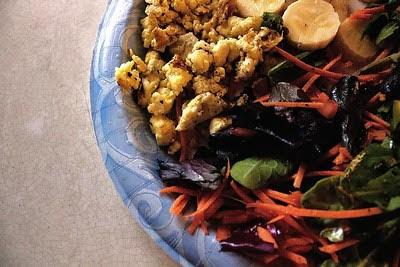People who follow a plant-based diet may be at 39% lower risk of COVID-19 infection and a 38% lower risk of severe symptoms, an observational study by Brazilian researchers suggests, although some experts cite confounding factors that could have skewed the results.
Universidade de Sao Paulo researchers recruited 702 adults to complete online questionnaires on sociodemographic factors, lifestyle, medical history, eating patterns, and COVID-19 infection, severity, and duration from March to July 2022 (Delta and Omicron variant waves). BMJ Nutrition, Prevention & Health published the results yesterday.
Participants were classified as omnivorous (424 patients) or plant-based (278), with the plant-based group subdivided into vegetarians (191) and flexitarians (87). Omnivores eat food of any animal origin, while people with a plant-based diet may follow several dietary patterns, including flexitarian (eating meat no more than three times per week), lacto-ovo-vegetarians (eating eggs and/or milk but no meat, fish, or shellfish), and strict vegetarians or vegans (eating no animal-derived foods).
"Populations that consume a diet rich in animal foods, with high amounts of saturated fats, and ultra-processed foods, have a higher prevalence of cardiometabolic diseases, risk factors for complications of COVID-19 in adults and the elderly," the study authors noted. On the other hand, "plant-based dietary patterns are rich in antioxidants, phytosterols and polyphenols, which positively affect several cell types implicated in the immune function and exhibit direct antiviral properties."
More severe infections in omnivores
In total, 330 people (47.0%) reported a COVID-19 diagnosis, 224 (31.9%) of them with mild illness and 106 (15.1%) with moderate or severe illness. Omnivorous respondents had a significantly higher rate of COVID-19 than plant-based participants (51.6% vs 39.9%).
Of COVID-positive respondents, those who were omnivorous had a higher rate of moderate or severe disease than the plant-based group (17.7% vs 11.2%), but illness duration didn't differ between the two groups.
Participants who followed a plant-based or vegetarian diet consumed more fruits and vegetables, legumes, cereals, nuts and seeds, and vegetable oils and less dairy, eggs, and meat. In contrast, omnivores ate more meat.
After adjusting for confounders such as body mass index (BMI), physical activity, and underlying medical conditions, the plant-based and vegetarian group each had a 39% (odds ratio [OR], 0.61) lower chance of COVID-19 infection than omnivores. There was no difference in illness duration.
In an analysis of the link between diet and COVID-19 severity using models of the omnivorous and plant-based groups, the latter had a 38% lower rate of infection in the crude model (OR, 0.62). After adjusting for potential confounding factors, the rate ranged from 41% in model 1 to 39% in model 3, with the lowest COVID-19 rate in plant-based respondents.
Omnivores less healthy to begin with
Omnivores had a higher rate of chronic conditions than the plant-based participants had. Of all participants, 62.5% reported being physically active. The plant-based group reported a higher rate of physical activity than their omnivorous counterparts. Average BMI and prevalence of overweight and obesity was significantly lower in plant-based respondents than in their omnivorous peers.
Vegetarians and flexitarians had a lower chance of COVID-19 infection in the crude analysis (OR, 0.62 and 0.63, respectively) and in model 1 (OR, 0.58 and 0.61, respectively). These findings held true in models 2 and 3 (OR for both, 0.61).
Average BMI and prevalence of overweight and obesity was significantly lower in plant-based respondents than in their omnivorous peers.
"Due to the high intake of some key nutrients and phytochemicals in groups following plant-based diets, it is plausible that a difference in immune status might be observed between plant-based and omnivorous dietary patterns," the authors wrote.
There were no significant differences in sex, age, or vaccination uptake between the omnivores and plant-based groups.
"In light of these findings and findings of other studies and because of the importance of identifying factors that can influence the incidence of COVID-19, we recommend the practice of following plant-based diets or vegetarian dietary patterns," the researchers concluded.
They noted that only two studies have reported similar findings. The differences, they said, could be related to geographic factors and circulating variants.
Caveats and criticism
In a BMJ news release, Shane McAuliffe of the NNEdPro Global Institute for Food, Nutrition and Health, which co-owns BMJ Nutrition Prevention & Health with BMJ, said the research adds to evidence suggesting the role of diet in COVID-19 susceptibility. "But this remains an area of research that warrants more rigorous and high quality investigation before any firm conclusions can be drawn about whether particular dietary patterns increase the risk of COVID-19 infection," he said.



















